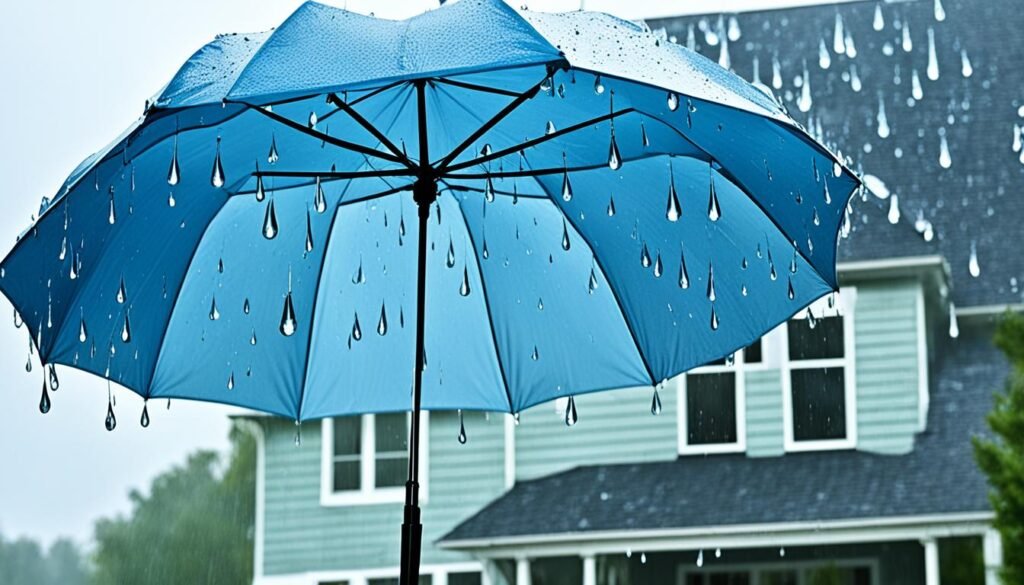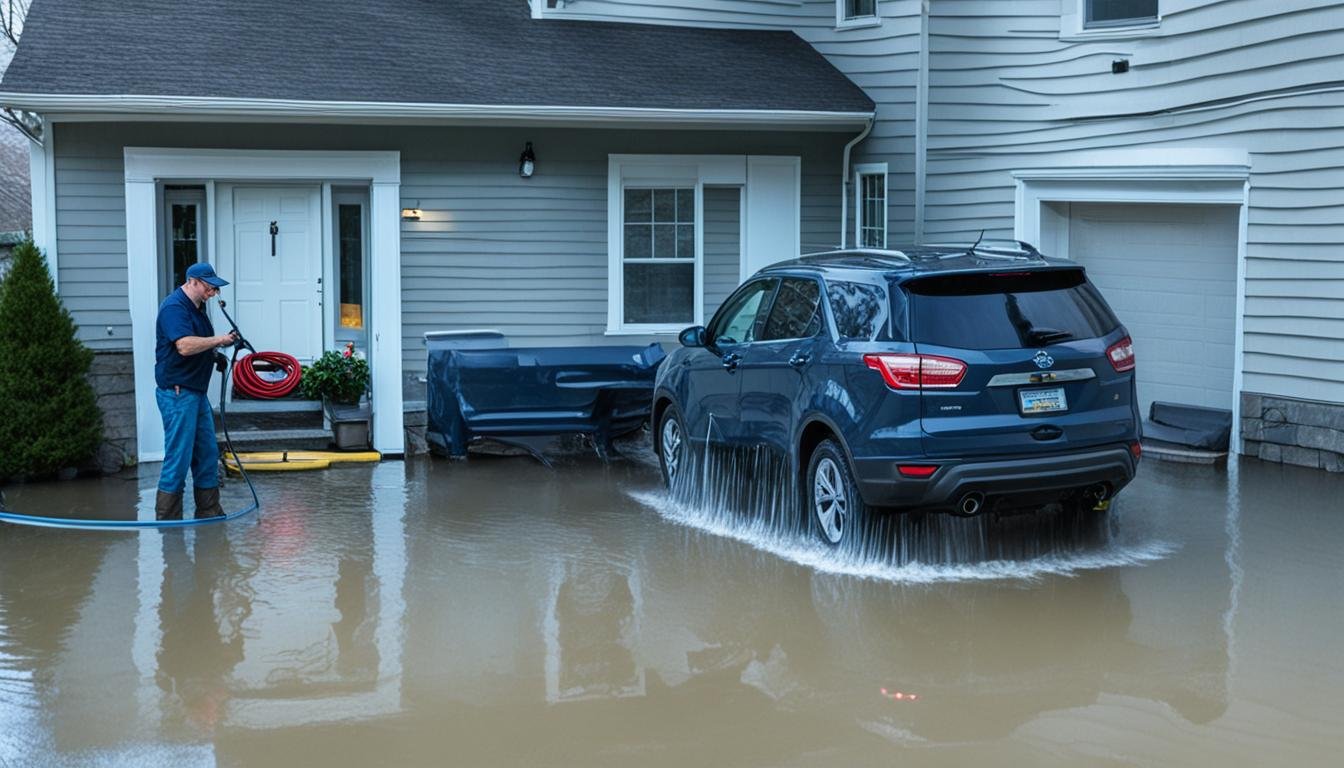Water damage in a home is a serious issue that can lead to costly repairs and property loss. It can cause black mold, rot drywall, and weaken the foundation and structure of your home. However, with some preventive measures, you can minimize the risk of water damage and protect your investment.
To prevent water damage, it’s important to take proactive steps to keep your home safe and dry. Here are some practical tips to help you prevent water damage:
Key Takeaways:
- Disconnect hoses in cold weather to prevent frozen and burst pipes.
- Regularly clean gutters to ensure proper water drainage.
- Trim trees and remove dead branches to prevent them from falling and causing damage.
- Check for plumbing leaks and address them promptly to prevent water damage.
- Monitor water pressure and ensure it is within the recommended range to avoid pipe bursts.
By following these water damage prevention tips, you can safeguard your home and avoid the headaches and expenses associated with water damage. Remember to stay vigilant and address any potential issues promptly to protect your property.
Tips for Avoiding Water Damage at Home
When it comes to protecting your home from water damage, prevention is the key. By taking a few simple steps, you can minimize the risk of water damage and avoid costly repairs.
- Inspect and maintain your plumbing system: Regularly check for leaks and fix them promptly. Ensure that the water supply lines to appliances and fixtures are in good condition.
- Keep gutters and downspouts clean: Clogged gutters can lead to water overflow, causing damage to your roof and foundation. Clean them regularly and consider installing gutter guards.
- Monitor your water bill: A sudden increase in your water bill could indicate a hidden leak. If you notice a significant change, investigate and address the issue immediately.
- Install a water leak detection system: These systems can alert you to leaks or water buildup in areas prone to water damage, such as basements and utility rooms.
- Properly maintain your landscaping: Ensure that the ground around your home slopes away from the foundation to prevent water from seeping into your basement or crawl space. Trim tree branches near your house to prevent them from falling on your roof during storms.
- Protect your home during freezing temperatures: Disconnect and drain outdoor hoses before winter arrives. Insulate exposed pipes, and keep your home adequately heated to prevent frozen pipes.
- Regularly inspect your roof: Check for missing or damaged shingles and repair them promptly. A well-maintained roof is crucial in keeping water out of your home.
- Be cautious with appliances and fixtures: Check washing machine hoses regularly for signs of wear and tear, and replace them if necessary. Avoid leaving taps running unattended, and never ignore plumbing leaks.
Implementing these water damage prevention tips can help you safeguard your home and avoid the inconvenience and expense of water damage accidents. Remember, taking proactive steps now can save you significant time, money, and stress in the future.

The Importance of Maintenance and Insurance Coverage
Proper home maintenance plays a crucial role in preventing water damage. By regularly inspecting and maintaining your home’s plumbing, appliances, and exterior, you can identify potential issues before they escalate into water damage disasters. This proactive approach can save you from the headache and expense of dealing with water damage.
To prevent water damage, it’s essential to replace worn-out supply lines and keep an eye out for signs of corrosion and leaks in your plumbing and heating pipes. Additionally, maintaining the caulking around showers and tubs can help prevent water from seeping into walls and causing hidden damage.
While maintaining your home is crucial, it’s also wise to have adequate insurance coverage to protect against water damage. Water damage insurance coverage can provide financial assistance in the event of unexpected water-related incidents, such as burst pipes or appliance leaks. It’s important to review your home insurance policy to ensure that you are adequately covered, as water damage can be costly to repair.
By combining regular home maintenance with the right insurance coverage, you can prevent water damage and have peace of mind knowing that you are prepared for unforeseen eventualities. Remember, taking preventive measures, such as conducting regular inspections, replacing worn-out components, and staying up to date with insurance coverage, can help safeguard your home.
FAQ
What are some practical tips for avoiding water damage at home?
To avoid water damage at home, it’s important to regularly inspect and maintain your home’s plumbing, appliances, and exterior. Replace worn-out supply lines, maintain caulking around showers and tubs, and check for signs of corrosion and leaks in plumbing and heating pipes.
How can I prevent water damage in my house?
Preventing water damage in your house involves taking proactive measures such as disconnecting hoses in cold weather, regularly cleaning gutters, trimming trees, checking for plumbing leaks, monitoring water pressure, and keeping an eye on your water bill. It’s also crucial to know the location of your water main and inspect your home’s exterior for potential issues.
Why is home maintenance important in preventing water damage?
Home maintenance plays a crucial role in preventing water damage as it helps identify potential issues before they cause significant damage. Regularly inspecting and maintaining your home’s plumbing, appliances, and exterior can help prevent leaks, corrosion, and other problems that could lead to water damage.
Does water damage insurance coverage help in preventing water damage?
While water damage insurance coverage does not directly prevent water damage, it can provide financial protection in case water damage occurs. By ensuring you have appropriate home insurance coverage for water damage, you can mitigate the financial burden of repairs and replacements caused by water damage incidents.


